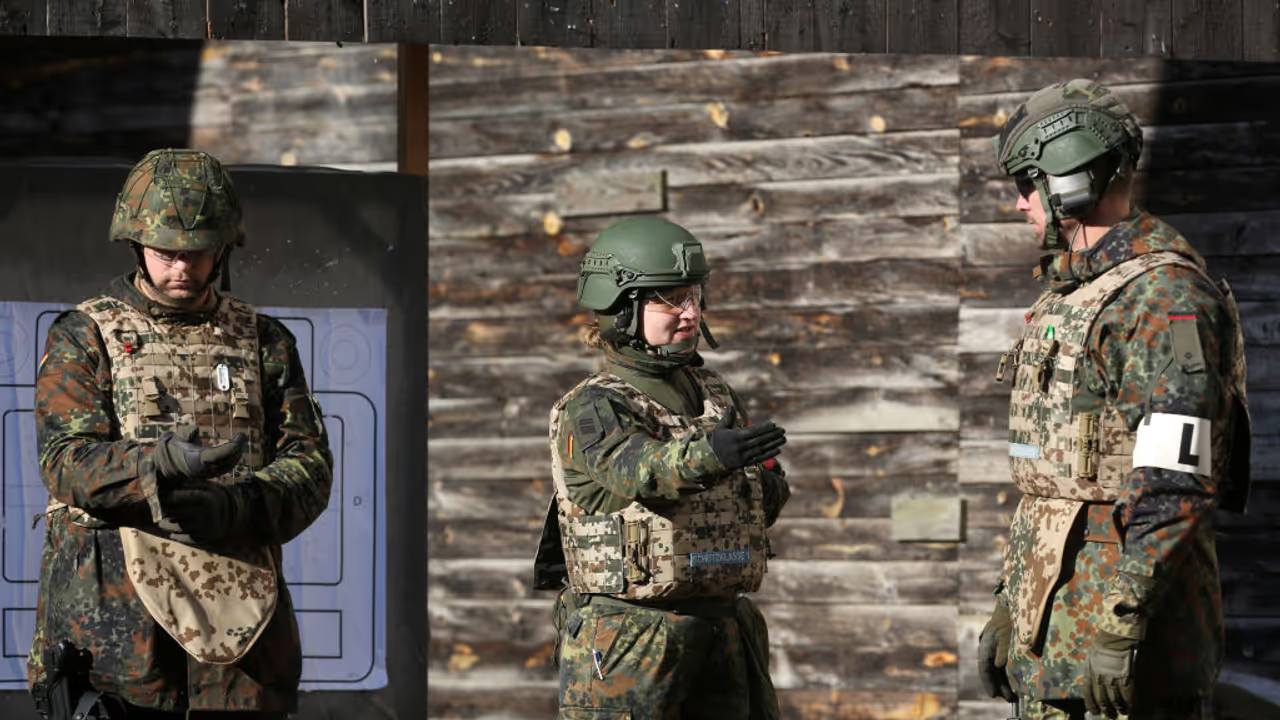The "Operationsplan Deutschland" reportedly includes detailed instructions for safeguarding vital assets and sets out protocols for defending the country in the event of a Russian military threat.
In light of escalating tensions in Europe, the German federal army (Bundeswehr) has reportedly begun instructing German companies on how to prepare for a potential military conflict, including the possible extension of the Ukraine war into the rest of Europe. According to German newspaper 'Frankfurter Allgemeine Zeitung', this is part of a comprehensive strategy outlined in the secretive "Operationsplan Deutschland" – a highly classified document that spans over a thousand pages. The purported plan, developed by government officials and military leaders, is primarily focused on protecting Germany’s critical infrastructure from external threats, particularly cyberattacks.

The "Operationsplan Deutschland" reportedly includes detailed instructions for safeguarding vital assets and sets out protocols for defending the country in the event of a Russian military threat. Notably, it designates key infrastructure that must be defended and highlights the crucial role of the civilian sector, particularly industry, in national defense. The Territorial Command of the Bundeswehr, under the leadership of Lieutenant General Andre Bodemann, is said to be responsible for implementing these strategies, which are supported by the Inspector General of the Bundeswehr, General Carsten Breuer.
One of the first steps in this large-scale defense initiative took place in Hamburg, where the Bundeswehr held a seminar for local companies to outline the key elements of the plan. Lieutenant Colonel Jorn Plischke led the session, advising business leaders to prepare their organizations for crisis scenarios. In particular, Plischke suggested that large companies train at least 5% of their workforce in essential skills, such as truck driving, to ensure the country can maintain its transportation system in times of need.
"70% of all trucks circulating in Germany are driven by drivers from Eastern Europe. If there is war in those countries, where will those people be then?" the military officer reportedly asked the attendees.
According to the report, Plischke also urged all attendees to create their own tailored action plans in the event that Germany becomes involved in a military conflict, outlining the roles and responsibilities of each employee during a crisis. He emphasized the importance of workforce awareness on security matters for self-protection. Additionally, he suggested that companies consider becoming more self-sufficient, possibly by using diesel generators or even installing their own wind turbines. Plischke also mentioned that similar meetings would be held across the country.
"All territorial command centers are tasked with implementing the plan," a Bundeswehr spokesperson told the 'Frankfurter Allgemeine Zeitung'.
Malte Heyne, Director General of the Hamburg Chamber of Commerce, emphasized the importance of a resilient economy for the nation’s defense. "We need to be aware of how important a well-prepared and resilient economy is for the civil and military defense of Germany," Heyne told the newspaper.
According to the Federal Army itself, it "depends on the help of civil society and civilian companies in a crisis and defense situation."
'Operationsplan Deutschland' highlights threats posed by hybrid warfare tactics
The "Operationsplan Deutschland" also highlights the increasing threats posed by hybrid warfare tactics, including cyberattacks, sabotage, and terrorism. The plan stresses that these challenges "cannot be controlled purely from a military perspective, but must be mastered by the state and society as a whole." It further highlights that "maximum civil support is a decisive factor" and "civil-military interaction for mutual support of the entire state" is a "central element" of the Operational Plan for Germany.
According to the Bundeswehr, civilian sectors, particularly logistics and energy, are crucial for maintaining national security during a conflict. Reliable transportation and energy supply chains are deemed indispensable for the functioning of the military.
The document outlines Germany's geostrategic role within NATO, suggesting that in the event of a war with Russia, German forces would likely be deployed to the eastern flank of NATO, including the Baltic States, Poland, Romania, Slovakia, and Finland. As a result, the military anticipates that the Bundeswehr's combat forces would not remain on German soil but would be stationed at NATO’s frontier.
Germany, France back US decision to let Ukraine use missiles to strike Russia
On Monday, Germany expressed its support for a decision by the United States to allow Ukraine to use American-made weapons in strikes against Russian targets. The United States has taken an important decision in terms of its support for Ukraine’s air defenses, German Foreign Minister Annalena Baerbock said while stressing that this was not a shift in strategy by the West.
“The decision from the American side, and I would like to emphasize that this is not a rethink but an intensification of what has already been delivered by other partners, is so important at this moment,” Baerbock said in Brussels ahead of a meeting of EU foreign ministers.
Meanwhile, France signaled that allowing Ukraine to strike military targets inside Russia remains an option, with the possibility of using long-range missiles supplied to Kyiv. “We openly said this was an option that we would consider if it was to allow to strike a target from where Russia is currently aggressing Ukrainian territory. So nothing new on the other side,” Jean-Noel Barrot told journalists ahead of a EU ministers’ meeting in Brussels.
Lithuania’s Foreign Minister, Gabrielius Landsbergis, expressed uncertainty on Monday about whether Ukraine has sufficient missile supplies to defend itself, even if granted the ability to strike inside Russia.
“I’m not opening champagne just yet, because we don’t know the actual numbers of how many rockets Ukraine has,” Gabrielius Landsbergis said before a meeting with other EU foreign ministers in Brussels. “So the question is, are they provided enough rockets that would make a difference in the battlefield.”
US President Joe Biden's administration has authorized Ukraine to use US-made weapons for strikes deep within Russia. This marks a significant shift in Washington's policy regarding the Ukraine-Russia conflict.
